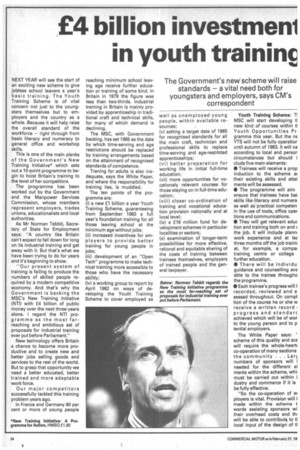1E4 billion investmeni in youth traininc
Page 30

Page 31

If you've noticed an error in this article please click here to report it so we can fix it.
The Government's new scheme will raise standards — a vital need both for youngsters and employers, says CM's correspondent
NEXT YEAR will see the start of an exciting new scheme to give jobless school leavers a year's basic training. The Youth Training Scheme is of vital concern not just to the youngsters themselves but to employers and the country as a whole. Because it will help raise the overall standard of the workforce — right through from basic literacy and numeracy to general office and workshop skills.
This is one of the main planks of the Government's New Training Initiative* which sets out a 10-point programme to begin to hoist Britain's training to the level of her competitors.
The programme has been worked out by the Government and the Manpower Services Commission, whose members represent employers, trades unions, educationalists and focal authorities.
As Mr Norman Tebbit, Secretary of State for Employment says: "A country like Britain can't expect to fall down for long on its industrial training and get away with it. But that's what we have been trying to do for years and it's beginning to show.
"'Our present system of training is failing to produce the numbers of skilled people required by a modern competitive economy. And that's why the Government is backing the MSC's New Training Initiative (NTI) with E4 billion of public money over the next three years alone. I regard • the NTI programme as the most farreaching and ambitious set of proposals for industrial training ever put before Parliament."
New technology offers Britain a chance to become more productive and to create new and better jobs selling goods and services to the rest of the world. But to grasp that opportunity we need a better educated, better trained and more adaptable workforce.
Our major competitors successfully tackled this training problem years ago.
In France and Germany 80 per cent or more of young people reaching minimum school leaving age receive further education or training of some kind. In Britain in 1979 the figure was less than two-thirds. Industrial training in Britain is mainly provided by apprenticeship in traditional craft and technical skills, for many of which demand is declining.
The MSC, with Government backing, has set 1985 as the date by which time-serving and age restrictions should be replaced by training arrangements based on the attainment of recognised standards of competence.
Traning for adults is also inadequate, says the White Paper, and where the responsibility for training lies, is muddied.
The ten points of the programme are: (i) a new £1 billion a year Youth Training Scheme, guaranteeing from September 1983 a full year's foundation training for all those leaving school at the minimum age without jobs; (ii) increased incentives for employers to provide better training for young people in jobs; (iii) development of an "Open Tech" programme to make technical training more accessible to those who have the necessary ability; (iv) a working group to report by April 1982 on ways of developing the Youth Training Scheme to cover employed as well as unemployed young people, within available resources; (v) setting a target date of 1985 for recognised standards for all the main craft, technician and professional skills to replace time-serving and age-restricted apprenticeships; (vi) better preparation for working life in initial full-time education; (vii) more opportunities for vocationaly relevant courses for those staying on in full-time education; (viii) closer co-ordination of training and vocational education provision nationally and at local level; (ix) a £16 million fund for development schemes in particular localities or sectors; (xj examination of longer-term possibilities for more effective, rational and equitable sharing of the costs of training between trainees themselves, employers of trained people and the general taxpayer.
Youth Training Scheme: TI MSC will start developing tl new kind of courses within tl Youth Opportunities Pr, gramme this year. But the nE YTS will not be fully operatior until autumn of 1983. It will va according to local and persor circumstances but should i clude five main elements:
• Trainees will receive a prop induction to the scheme ar • their existing skills and attai ments will be assessed.
• The programme will aim ensure that trainees have ba: skills like literacy and numera as well as.practical competen in the use of tools, office oper tions and communications.
• They will get relevant educ tion and training both on and c the job. It will include plannt work experience and at lea three months off the job trainir at, for example, a compat training centre or college further education.
• There will be individu guidance and counselling ava able to the trainee througho the programme.
• Each trainee's progress will recorded, reviewed and a sessed throughout. On compl lion of the course he or she w receive a written record I progress and standarc achieved which will be of wor to the young person and to p tential employers.
The White Paper says: ' scheme of this quality and sca will require the whole-hearti co-operation of many sections the community . . . Larc numbers of sponsors will needed for the different el ments within the scheme, whit must be carried out within i dustry and commerce if it is be fully effective.
"So the co-operation of er ployers is vital. Provision will made within the scheme t wards assisting sponsors wi their overhead costs and tht will be able to contribute to tl local input of the design of tl ining programme."
'recisely which overhead ]ht be reimbursed to ' emyers have yet to be worked :, but this is an improvement Work Experience Schemes Jer YOP where sponsors have pay their own expenses in mection with the scheme.
Mr Norman Tebbit points out t YTS is not a "revamped P scheme with a bit of icing. IP is a work experience heme; YTS is first and emost a training scheme." Jevertheless the MSC drew ivily upon the lessons learned m YOP schemes in planning S. Their success can be seen the readiness of many organ iions to assist in the provision places and the value of emyers have placed on the exrience gained by YOP inees.
'he new scheme will not start :il 1983 and it is vital to the antry's youth that everyone o has been involved in YOP, we all employers who have ivided places, should conJe their support and — where ;sible — strengthen it.
Jot conscription: Ministers re strongly rebutted sugges-is that this in any way resems "conscription". What will )pen, from September 1983, hat 16-year-old school leavers I, like those staying on, no ger be entitled to supplemen( benefit for themselves. They I, of course, be guaranteed an 3ensive year's traineeship, ored to their particular needs. they accept, they will be paid raining allowance which remises their different position m a sixth form student and I cover their basic outgoings. he level of the allowance also :ognises the contribution ich they should be prepared make towards the cost of ning. It has not been finally tled — and the Government asked the MSC to advise on ; — but Ministers have sug;ted something around £720 a Ir.
)Ider school leavers, who are at present guaranteed a ce on the scheme, will still be itled to supplementary beneand a higher allowance has m suggested for them.
Ieforrn of skill training: Just mportant as the YTS, are the pose's for reform in the argements for training in craft, hnician and professional Is both for young people and ilts. The White Paper stresses ! uncertainty attached to dictions of future skill reirements which "puts a mium on flexibility and moty within the workforce. A key to this is a training system embodying a wide range of recognised standards of achievement. Access to skilled work, or training to higher levels, should depend not on the form and structure of previous training but on proven ability.'' The White Paper mentions the many institutions, such as City and Guilds of London Institute, with considerable expertise in defining and testing standards of individual competence have been seen as optional rather than basic.
The Government has endorsed the commitment by the Manpower Services Commis sion to 1985 as the date by which relevant standards of compe tence, with associated courses and certificates, should be available for all significant skilled oc cupations. It urges those en gaged in collective bargaining nationally and locally to replace agreements based on time serv ing and age restrictions with arrangements based on such stan dards by the same date. It intends to make its financial support for skill training in in dustry increasingly conditional upon steps towards implementation of these reforms.
Skill shortages cannot be met solely by training young people and wider opportunities for training and retraining people in their 20s, 30s and later are bound to be required to meet the changing needs of industry. This is first a matter for industry it self, but the Government is continuing to provide some £250 million a year for this purpose under the Training Opportunities Programme.
The White Paper also announces Government funding for an Open Tech programme designed to provide new opportunities particularly for people who want to-train for technician and supervisory posts but are barred from traditional methods through constraints of time, place or qualification.
It will work through existing industry and educational chan nels using so-called "distance learning" methods supplemented by local tutorial help and facilities. The first project will start this year.
The White Paper sets out a framework.of what needs to be
done by employers, employees, unions, educationalists and Government to produce the number of skilled people required by a modern competitive economy. It considers that in the longer term the responsibility for training must lie mainly with employers, as it does in most other major industrial countries.


















































